The current system used to assess greenhouse gas (GHG) emissions from agriculture is misleading, and rather than focusing on total emissions, we must ensure farming does not contribute any further to global warming, a leading climate scientist has said.
Delivering a presentation to around 800 farmers at a Climate Summit organised by the Irish Farmers Journal in Co Tyrone, Professor Myles Allen from the University of Oxford appealed for new thinking around how biogenic methane from ruminants is assessed.
“This is not contested science.
“Methane is a different gas, it behaves in a totally different way.
“We need a [separate] target for biogenic methane which reflects its impact on global temperature,” said Prof Allen.
[...] The cattle and sheep sector in Northern Ireland (NI) would have to be virtually wiped out by 2050 in order to achieve net zero for all emissions
At present, around two-thirds of GHG emissions from Irish agriculture is biogenic methane produced by ruminating livestock.
Independent analysis by accountancy firm KPMG has shown that the cattle and sheep sector in Northern Ireland (NI) would have to be virtually wiped out by 2050 in order to achieve net zero for all emissions, including methane.
A similar KPMG analysis in the Republic of Ireland also points out that current technologies can only deliver a certain level of total emissions reduction (around 18%) and beyond that, cuts to livestock numbers are required.
Misunderstood
During his presentation, Prof Allen explained that methane is a potent GHG, but is very badly misunderstood. It is short-lived in the atmosphere, unlike other gases such as carbon dioxide (CO2) and nitrous oxide (N2O) which remain for centuries, and therefore have a permanent global warming effect.
“If you release a tonne of methane into the atmosphere, within 10 years two-thirds of it is gone.
“Within 20 years, 90% of it is gone. As soon as we start to reduce methane emissions, temperatures start to follow it down,” he said.
Concerns
Where a cattle herd is stable, methane produced today effectively replaces methane released 10-20 years ago, so the impact on global temperatures is neutral. But keeping more livestock increases methane emissions and will lead to significant global warming.
Allen highlighted concerns that emissions are rising globally, especially in parts of the world where production is not that efficient.
“We have to stop that,” he suggested.
NI agriculture
In his calculations, he said that if NI agriculture reduced CO2 and N2O to zero by 2050, and reduced methane emissions by 14% over the same period, it is enough to stop NI agriculture causing any global warming after 2035.
If NI reduced methane by 32% over the period to 2050, it would in effect, mean NI agriculture caused no more global warming from 2020 onwards.
“That’s not what we are asking the transport sector to do – we would like the transport sector to stop causing global warming by 2050,” he argued.
He said that if NI politicians continue with their plan for all GHG emissions (including methane) to be net zero by 2050 it essentially means you would end up taking the NI agriculture contribution to global warming back to the level it was in 1980.
You are being asked to do far far more than any other sector
“For the transport sector to do that, it would not be enough for everybody to start driving electric cars powered by renewable energy tomorrow. We would also have to clean out of the atmosphere all the CO2 emitted by transport sector between 1980 and today. That would be the equivalent ask,” said Prof Allen.
“You are being asked to do far far more than any other sector by these [net zero] targets. You are being asked not just to stop causing any further global warming from now on, but to actually undo all the warming you have caused since 1980,” he added.
I put it to this audience – is that true? Is this going to be easy for you?
He also suggested that the reason some policymakers prefer to ignore the arguments around methane is because they think it is easier to reduce cattle and sheep numbers than ask the owner of a closed power station to take their carbon back out of the atmosphere.
“I put it to this audience – is that true? Is this going to be easy for you?”
Challenge put to politicians
Concluding his presentation, the Oxford professor challenged local politicians to be “pioneers in the world by thinking this through”.
The aim, he suggested, is to end up with a policy that incentivises the ultimate goal, which should be to limit our impact on global temperature rise.
“This pretence that we have to reduce methane to zero is actually making a hard task, impossible.
We have to get this right
“That is why I find this whole debate so frustrating, because actually you guys are the solution. We should be working together on this, not picking fights.
“We have to get this right. We cannot solve the climate crisis without the farming community. The certain way to failure is to shove the farming community out the door,” he said.
Paris agreement is about temperature
A key argument made by Prof Allen is that the 2015 Paris Agreement signed by 196 countries did not set a target for emissions, but instead a target to limit global warming to well below 2°C, and preferably to 1.5°C, compared to pre-industrial levels.
As soon as you mash together methane, CO2 and N2O, you end up with an amalgam that means absolutely nothing
As a result, it is the impact of a pollutant gas on global warming that matters, and if some greenhouse gases (such as CO2 and N2O) last for centuries, while others, such as methane, last for 10 to 20 years, then they should be considered separately.
“As soon as you mash together methane, CO2 and N2O, you end up with an amalgam that means absolutely nothing,” he said.
He is not an advocate of the current system used to assess emissions (Global Warming Potential – GWP100), which expresses all emissions as CO2 equivalent.
Prof Allen points out that this system overstates the impact if methane remains constant, but underestimates the warming impact of rising methane.
A scientific paper written by 33 scientists, with Prof Allen as the lead author, was recently published in the journal Nature, and calls on companies and countries to set separate targets for short and long-lived gases.
GWP100 gives a completely misleading impression
In addition, the sixth assessment report by the Intergovernmental Panel on Climate Change (IPPC) drew attention to the fact that GWP100 overstates the effect of constant methane on global temperatures by a factor of three to four. The GWP100 metric also understates the effect of any new methane emission source by a factor of four to five.
“GWP100 gives a completely misleading impression,” said Prof Allen.
He is also critical of all the carbon calculators currently in use to work out emissions from farms, claiming that they “completely misrepresent” the impact of each farm on global temperatures.
About Professor Myles Allen
Myles Allen is a world renowned climate scientist, and is currently Professor of Geosystem Science at the University of Oxford, and director of the Oxford Net Zero initiative.
He was the coordinating lead author on the Intergovernmental Panel on Climate Change (IPCC) Special Report on 1.5°, having served on the IPCC’s third, fourth and fifth assessments. He is also widely credited as being the person who first demonstrated, 15 years ago, the need for net zero CO2 emissions to stop global warming.
Read more
Final push to amend NI climate bill
Teagasc admits MACC measures not enough to curb emissions
The current system used to assess greenhouse gas (GHG) emissions from agriculture is misleading, and rather than focusing on total emissions, we must ensure farming does not contribute any further to global warming, a leading climate scientist has said.
Delivering a presentation to around 800 farmers at a Climate Summit organised by the Irish Farmers Journal in Co Tyrone, Professor Myles Allen from the University of Oxford appealed for new thinking around how biogenic methane from ruminants is assessed.
“This is not contested science.
“Methane is a different gas, it behaves in a totally different way.
“We need a [separate] target for biogenic methane which reflects its impact on global temperature,” said Prof Allen.
[...] The cattle and sheep sector in Northern Ireland (NI) would have to be virtually wiped out by 2050 in order to achieve net zero for all emissions
At present, around two-thirds of GHG emissions from Irish agriculture is biogenic methane produced by ruminating livestock.
Independent analysis by accountancy firm KPMG has shown that the cattle and sheep sector in Northern Ireland (NI) would have to be virtually wiped out by 2050 in order to achieve net zero for all emissions, including methane.
A similar KPMG analysis in the Republic of Ireland also points out that current technologies can only deliver a certain level of total emissions reduction (around 18%) and beyond that, cuts to livestock numbers are required.
Misunderstood
During his presentation, Prof Allen explained that methane is a potent GHG, but is very badly misunderstood. It is short-lived in the atmosphere, unlike other gases such as carbon dioxide (CO2) and nitrous oxide (N2O) which remain for centuries, and therefore have a permanent global warming effect.
“If you release a tonne of methane into the atmosphere, within 10 years two-thirds of it is gone.
“Within 20 years, 90% of it is gone. As soon as we start to reduce methane emissions, temperatures start to follow it down,” he said.
Concerns
Where a cattle herd is stable, methane produced today effectively replaces methane released 10-20 years ago, so the impact on global temperatures is neutral. But keeping more livestock increases methane emissions and will lead to significant global warming.
Allen highlighted concerns that emissions are rising globally, especially in parts of the world where production is not that efficient.
“We have to stop that,” he suggested.
NI agriculture
In his calculations, he said that if NI agriculture reduced CO2 and N2O to zero by 2050, and reduced methane emissions by 14% over the same period, it is enough to stop NI agriculture causing any global warming after 2035.
If NI reduced methane by 32% over the period to 2050, it would in effect, mean NI agriculture caused no more global warming from 2020 onwards.
“That’s not what we are asking the transport sector to do – we would like the transport sector to stop causing global warming by 2050,” he argued.
He said that if NI politicians continue with their plan for all GHG emissions (including methane) to be net zero by 2050 it essentially means you would end up taking the NI agriculture contribution to global warming back to the level it was in 1980.
You are being asked to do far far more than any other sector
“For the transport sector to do that, it would not be enough for everybody to start driving electric cars powered by renewable energy tomorrow. We would also have to clean out of the atmosphere all the CO2 emitted by transport sector between 1980 and today. That would be the equivalent ask,” said Prof Allen.
“You are being asked to do far far more than any other sector by these [net zero] targets. You are being asked not just to stop causing any further global warming from now on, but to actually undo all the warming you have caused since 1980,” he added.
I put it to this audience – is that true? Is this going to be easy for you?
He also suggested that the reason some policymakers prefer to ignore the arguments around methane is because they think it is easier to reduce cattle and sheep numbers than ask the owner of a closed power station to take their carbon back out of the atmosphere.
“I put it to this audience – is that true? Is this going to be easy for you?”
Challenge put to politicians
Concluding his presentation, the Oxford professor challenged local politicians to be “pioneers in the world by thinking this through”.
The aim, he suggested, is to end up with a policy that incentivises the ultimate goal, which should be to limit our impact on global temperature rise.
“This pretence that we have to reduce methane to zero is actually making a hard task, impossible.
We have to get this right
“That is why I find this whole debate so frustrating, because actually you guys are the solution. We should be working together on this, not picking fights.
“We have to get this right. We cannot solve the climate crisis without the farming community. The certain way to failure is to shove the farming community out the door,” he said.
Paris agreement is about temperature
A key argument made by Prof Allen is that the 2015 Paris Agreement signed by 196 countries did not set a target for emissions, but instead a target to limit global warming to well below 2°C, and preferably to 1.5°C, compared to pre-industrial levels.
As soon as you mash together methane, CO2 and N2O, you end up with an amalgam that means absolutely nothing
As a result, it is the impact of a pollutant gas on global warming that matters, and if some greenhouse gases (such as CO2 and N2O) last for centuries, while others, such as methane, last for 10 to 20 years, then they should be considered separately.
“As soon as you mash together methane, CO2 and N2O, you end up with an amalgam that means absolutely nothing,” he said.
He is not an advocate of the current system used to assess emissions (Global Warming Potential – GWP100), which expresses all emissions as CO2 equivalent.
Prof Allen points out that this system overstates the impact if methane remains constant, but underestimates the warming impact of rising methane.
A scientific paper written by 33 scientists, with Prof Allen as the lead author, was recently published in the journal Nature, and calls on companies and countries to set separate targets for short and long-lived gases.
GWP100 gives a completely misleading impression
In addition, the sixth assessment report by the Intergovernmental Panel on Climate Change (IPPC) drew attention to the fact that GWP100 overstates the effect of constant methane on global temperatures by a factor of three to four. The GWP100 metric also understates the effect of any new methane emission source by a factor of four to five.
“GWP100 gives a completely misleading impression,” said Prof Allen.
He is also critical of all the carbon calculators currently in use to work out emissions from farms, claiming that they “completely misrepresent” the impact of each farm on global temperatures.
About Professor Myles Allen
Myles Allen is a world renowned climate scientist, and is currently Professor of Geosystem Science at the University of Oxford, and director of the Oxford Net Zero initiative.
He was the coordinating lead author on the Intergovernmental Panel on Climate Change (IPCC) Special Report on 1.5°, having served on the IPCC’s third, fourth and fifth assessments. He is also widely credited as being the person who first demonstrated, 15 years ago, the need for net zero CO2 emissions to stop global warming.
Read more
Final push to amend NI climate bill
Teagasc admits MACC measures not enough to curb emissions




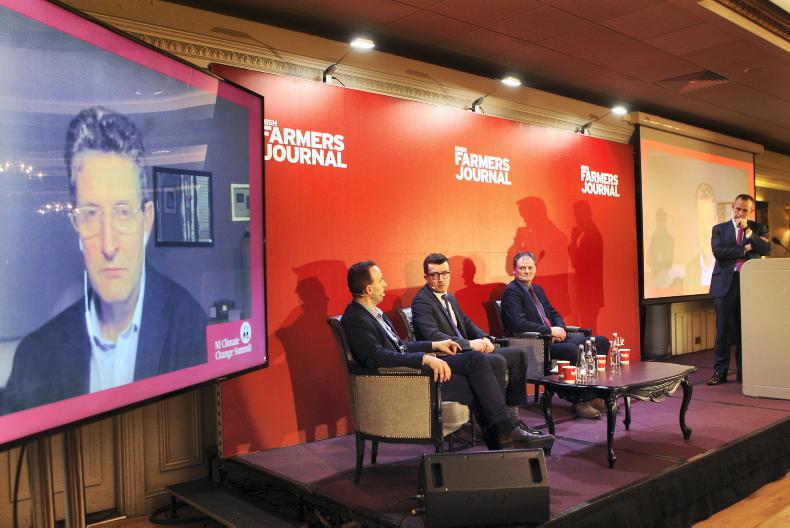
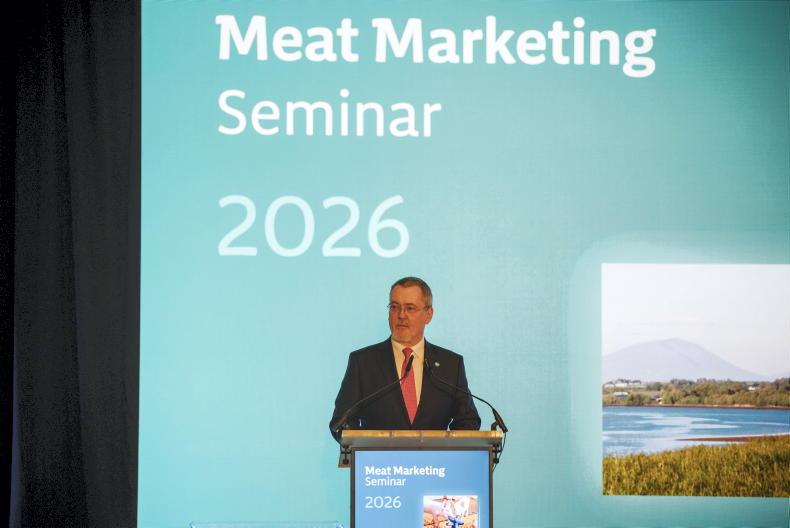

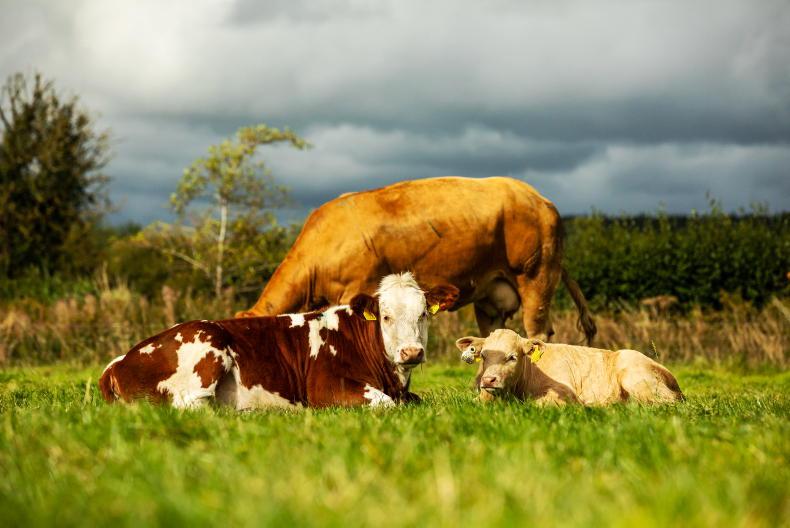
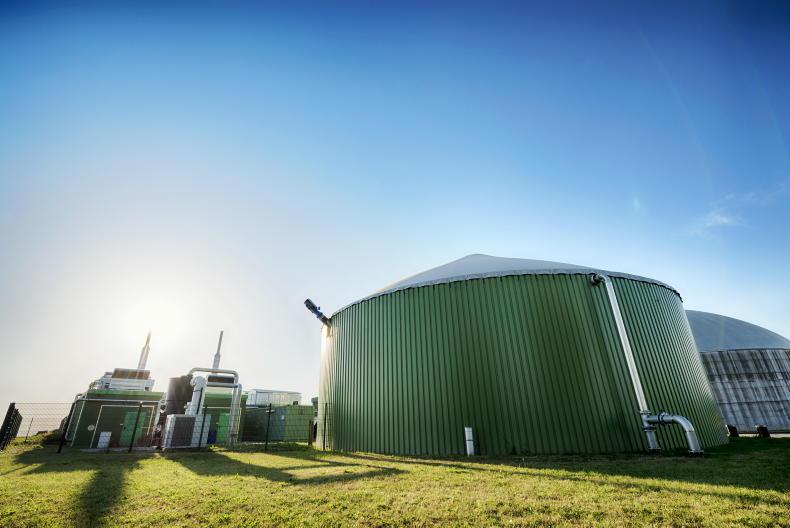
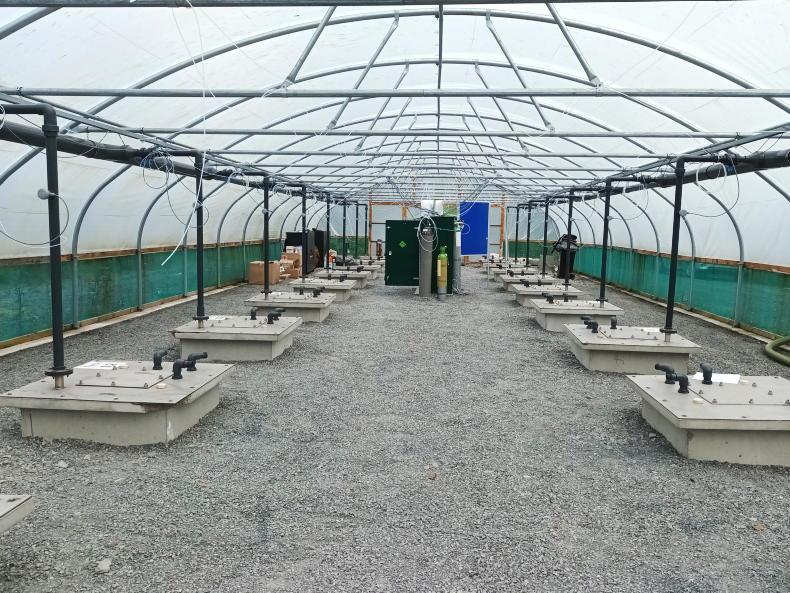
SHARING OPTIONS